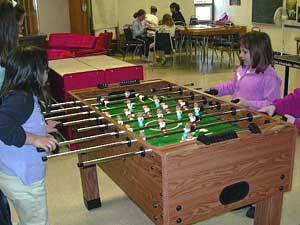Audio
Photos
Your Voice
| |||||||||||||||||||||||||||||||||||||||||||||||
Budget cuts hit after-school programs
April 7, 2003
 |
| Moorhead students enjoy games and educational projects in one of the programs paid for with after-school enrichment funds. (MPR Photo/Dan Gunderson) |
Moorhead, Minn. — Moorhead has had an extensive after-school program for nearly 10 years. Students can choose music or dance programs, study clubs, or sports. On an average afternoon, 10 different activities are scheduled.
That's likely to change in the near future. Gov. Tim Pawlenty eliminates after-school program funding in his proposed budget. The governor also used unallotment to cut funds earmarked for after-school programs this year.
One program paid for with state funds provides kids a place to go on vacation days. They gather at a Moorhead church to play games and work on art projects. This program is operated by the local Campfire Boys and Girls Club.
Campfire Director Myrna Johnson says it will be difficult to keep the program going without state funding.
"Right now I'm borrowing from Peter to pay Paul, because I'm taking funds I would be using this summer to do programs this spring while I'm searching for money," says Johnson. "Everyone says, well, you can go write a grant. I've already written three, and I've been denied three times."
|
They're going to be going home to empty houses, to be home alone. To nothing that is going to benefit them except television and computer.
- Sonja Hohnadel, after school program coordinator in Moorhead |
Johnson says there's increasing competition for foundation grants and less money available.
Moorhead was getting $146,000 a year from the state to run after school programs. Just over 1,000 students participated last year. That's about 20 percent of the student body.
Afterschool Enrichment Program coordinator Sonja Hohnadel says she's worried about what those kids will do if there are no supervised activities after school.
"They're going to be going home to empty houses, to be home alone. To nothing that is going to benefit them except television and computer," says Hohnadel. "The other thing I know I'm not going to see -- we're not going to see academic help the way we see now. Because we do have homework and study clubs after school."
Hohnadel says since after-school programs began, juvenile crime in Moorhead has fallen by 50 percent. She's not claiming after school programs are the only reason, but she thinks keeping kids off the streets after school keeps them out of trouble. Police agree after-school programs are part of the reason juvenile crime is down.
Moorhead is finding money to keep some after-school programs going, at least until the end of the school year.
Moorhead Healthy Community Initiative Director Barry Nelson oversees a variety of programs for children. Nelson says after-school programs are so important he's not willing to easily let them disappear.
"We need to express the seriousness of it all. It's not just, 'oh, this is ending but something else will take its place, and life will go on as it has in the past,'" says Nelson. "But I don't think we should paint the picture it's hopeless, there's nothing you can do, it's just going to go away despite the importance and the good that's going to come out of it. Because that would assure nobody steps up to the plate."
Nelson says foundations and Moorhead residents may help pick up the cost of some after-school programs. He's also hopeful the Legislature will restore some funding.
Minnesota Education Department spokesman Bill Walsh says a $4.5 billion deficit leaves the state no choice but to cut some areas of education. He says after-school programs are important, but classroom funding is a higher priority.
And Walsh says cuts to after-school programs may be temporary. Despite proposed federal cuts for after school programs, Walsh says there is federal money available. He says in past years the state hasn't been aggressive enough in going after that money.
"The commissioner -- having come from the (federal) Department of Education -- has a much different attitude about applying for federal grants. And we're going to be very aggressive in getting our share of federal funding," says Walsh. "There are mentoring programs available, and a lot of things that could replace some of the things we did in the state budget."
Walsh says it's possible the state will secure federal grants for after school programs by next year. He's hopeful local communities can keep the programs going until then.
|
News Headlines
|
Related Subjects
|

